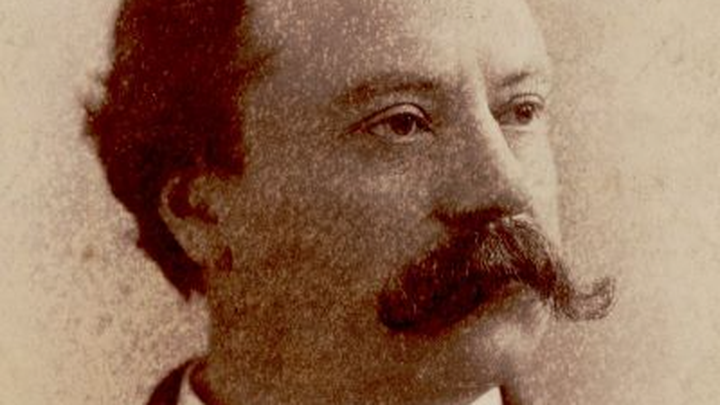
DENIS B. CASHMAN - Fenian Memorial Fund
Donation protected
The National Graves Association in Ireland is fundraising for a memorial to be erected over the grave of the Irish Patriot Denis B. Cashman who died in 1897 and is buried at Holyhood cemetery, Brookline, Massachusetts.
“...if I had my life to live over I would do it again. I am willing to die for Ireland”
Denis Bambrick Cashman was born in Dungarvan Co. Waterford in 1842. He joined the Fenian movement also known as the Irish Republican Brotherhood (IRB), when he was sixteen years old. He rose through the ranks becoming a Fenian Centre for Waterford, meaning that he had the authority to recruit and swear in new members to the organisation. He worked as a law clerk for Dobbyn and Tandy in Waterford before eventually moving to Dublin in the mid 1860’s to continue his Fenian activities.
Between 1865 and 1867 the British government suppressed the IRB, firstly by arresting the leadership of the organisation when they raided the offices of ‘The Irish People’, the Fenian newspaper in Dublin. Many more were arrested on the word of informers and after the failed rising of March 1867.
Cashman lived with his wife Catherine at 5 Preston Street, Dublin and with their two sons William and Arthur. It was reported to the police that he had been manufacturing and distributing rifle cartridges for the Fenians which led to his arrest on January 12th, 1867, around the same time as Catherine gave birth to their third son Denis junior.
Denis Cashman was convicted of treason felony on the 19th of February and sentenced to seven years in prison. He had been given the opportunity to plead guilty to a lesser charge by the prosecuting attorney but replied “No, if I had my life to live over I would do it again. I am willing to die for Ireland”. He spent some time in Millbank prison in England before he was transported to Australia on board the convict ship, Hougoumont at the beginning of October 1867.
In total there were 280 prisoners transported on board the Hougoumont, 62 of these were Fenians. During the three-month journey to Western Australia the prisoners often complained about the rancid food and water that was being served up to them. Whipping as a form of punishment was common and the preferred method of dealing with indiscipline by the ship’s Captain William Cozens. He forced the other prisoners to watch this brutal punishment and later had them clean up the blood from the ships deck.
The prisoners had access to pencil and paper which Cashman put to good use on the long voyage to the southern hemisphere. He kept a diary which has proved to be an invaluable source of information of life aboard the Hougoumont. Along with fellow Fenians John Boyle O’Reilly and John Flood they produced a weekly newspaper entitled ‘The Wild Goose’. Cashman was the editor, and the three men wrote poetry for the paper although most of the poems were written by O’Reilly and Flood. The Fenian prisoners would regularly spend their evenings singing and reciting patriotic ballads and poems.
These pastimes helped take their mind off what lay ahead for them at Freemantle prison to where they were destined. They had been assured by the guards on the ship that Freemantle was an unescapable prison.
In the last edition of ‘The Wild Goose’ Cashman wrote 'The end of your passage quickly approaches, and already your hearts are beginning to quicken with anticipation at what may be your future in the new land you are fast nearing. I know not what may be in store for you. I cannot pierce the inexorable veil of the future, drawn alike for me and for you; but bidding you a long farewell most likely, however we may wish it, never to meet again, I say to you - Courage, and trust in Providence.'
Shortly after reaching Freemantle prison, Cashman’s good friend, John Boyle O’Reilly was transferred to Bunbury and assigned with other prisoners to carry out road works. By mid-February 1869 O’Reilly was on his way to America having made good his escape with the help of a catholic priest, Father Patrick McCabe.
Back home in Ireland an amnesty committee was formed in November 1868 for the purpose of campaigning for the release of Irish political prisoners. The campaign had very significant support throughout Ireland and Britain which led to a gradual release of some prisoners. Denis Cashman was released from Freemantle prison in 1869 with several other Fenians, some of the prisoners returned to Ireland and others including Cashman set sail for San Francisco on board the ship, Baringa, from Sydney. From San Francisco he made his way to Boston where he was reunited with his wife Catherine and their son William. Sadly, their two other sons Arthur and Denis junior has died from measles whilst he was in prison.
Cashman was also reunited with his friend and fellow Fenian, John Boyle O’Reilly who was living in Boston. O’Reilly helped to secure a job for him working at ‘The Boston Pilot’ newspaper and book publisher. Although he never returned to Ireland, he always kept a keen interest in political events associated with Ireland’s struggle for independence. He was involved with the early planning to rescue Fenian prisoners from Freemantle prison in 1876 which led to six Fenians being rescued and brought to America aboard the Catalpa whaling ship. Cashman wrote the first biography of Michael Davitt, titled ‘The Life of Michael Davitt, with a history of the rise and development of the Irish National Land League’ published in 1881.
Denis Bambrick Cashman died suddenly at his home on the 8th of January 1897. He is buried at Holyhood cemetery in Brookline, Massachusetts with his wife, five of their children and a grandchild. Their grave is a short distance away from that of John Boyle O’Reilly.
Organizer
National Graves Association - Aidan Lambert
Organizer